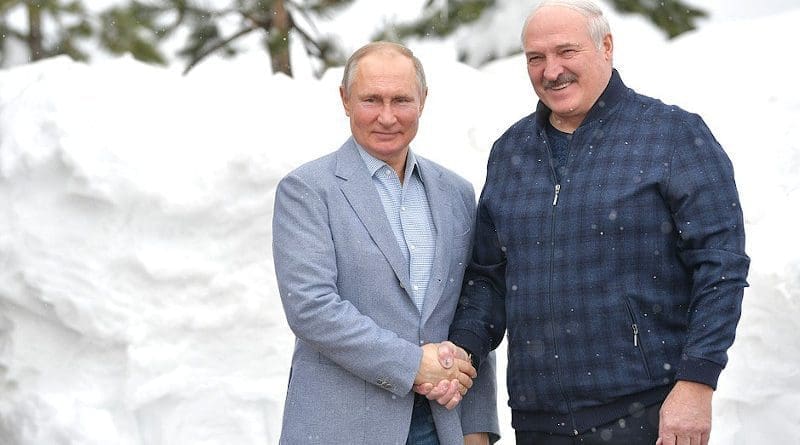The Kremlin Is Aware Of Lukashenko’s Deep Unpopularity – Interview
By SwissInfo
Just ahead of a visit to Geneva by Sviatlana Tsikhanouskaya, the main opposition leader to the Belarus President, Swiss political analyst Benno Zogg explains why political change in the country is inevitable.
By Sibilla Bondolfi
Protests throughout Belarus have been ongoing since President Alexander Lukashenko’s re-election in August 2020. Opposition and protesters are demonstrating against his 6th term in office and claiming the results were falsified, plunging the country into a political and economic crisis.
As the protests intensify, with tens of thousands taking to the streets regularly, Belarus’ only supporter, Russia, is losing patience and is showing signs it is dissociating itself from its long-term ally.
Benno Zogg is a researcher at the Center for Security Studies at the federal technology institute ETH Zurich.
SWI swissinfo.ch: In your latest research paper, you have outlined three potential paths for Belarus over the next five years. Can you elaborate?
Benno Zogg: I see three possible scenarios: a revolution, a dictatorship or a managed transition phase from the current autocracy to a more pluralistic divide of power. A revolution could fulfil the main demands of protesters – which would result in Lukashenko being chased out of office. A revolution could have two possible outcomes: either security forces prevail or protesters form a coalition government. From a Swiss point of view, the latter variant would be preferable.
swissinfo.ch: What about the other two possibilities ?
B.Z.: Unfortunately, a dictatorship prevails right now, and is intensifying. In recent months the regime has ramped up violence, arbitrary arrests and torture. This situation could get even worse if street protests blow up again. The Kremlin, which backs Lukashenko, risks becoming the main ally of a regime that shoots its citizens, which is hardly ideal from a Russian point of view.
Then we come to the third scenario, which would involve negotiating a new political order within the Belarusian elite. Such constitutional change – which Lukashenko has hinted at – would result in a wider array of political actors and parties, and a steady dilution of Lukashenko’s omnipotence. We will probably not see a democratic regime in five years’ time, but one that is somewhat more pluralistic.
swissinfo.ch: Which scenario do you think is most likely?
B.Z.: The third. The Kremlin has noticed Lukashenko’s unpopularity and has little sympathy for him. In the long run, Russia does not want to rely on him alone but on various political forces that could be influenced.
swissinfo.ch: Will Russia drop Lukashenko sooner or later?
B.Z.: The Russians are betting on Lukashenko for the time being and I don’t think they’ll drop him abruptly. A sudden change in the balance of power would bring instability to Belarus. Currently, Lukashenko is the best way to guarantee a Russia-friendly administration.
Because there are also protests in Russia itself – around the opposition figurehead Alexei Navalny – the Kremlin wants to stop unrest in neighboring countries from spreading.
swissinfo.ch: Economically, things are not looking good in Belarus either.
B.Z.: This is an important point. The Belarusian economy was stagnating before the pandemic. With the political crisis, it is even more difficult for the country to attract investment. In addition, many skilled people, especially from the IT industry, have left the country.
In the next few years Belarus will face economic difficulties, debt will spiral, inflation could rise and the population will suffer. You can already feel incomes falling in real terms. In addition to the political crisis there will be an economic crisis.
swissinfo.ch: Ukraine, Belarus, protests in Russia – what do these instabilities mean for Europe and Switzerland?
B.Z.: Each of these conflicts are very different. In general, western democracies have an interest in ensuring that pluralism prevails, that countries are as democratic as possible and respect human rights.
As an export nation, Switzerland also depends on a stable environment. The intensification of authoritarianism leads to instability and suffering. Such regimes are unsustainable in the long-term. Switzerland must therefore look to these countries with concern.

